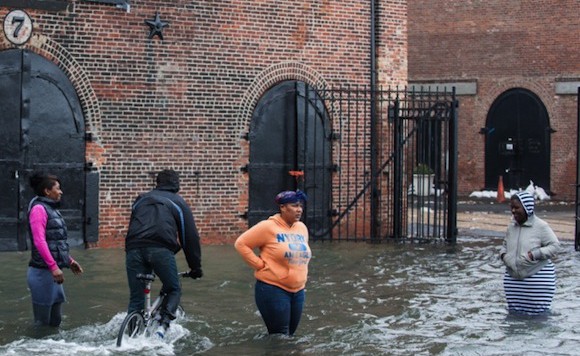1000 Days Since Sandy

This week marks the third anniversary of a moment that changed so many lives – including mine – forever. On October 29th, 2012 Hurricane Sandy’s storm surge hit New York City and for days poured destruction onto the city and the surrounding states. Thousands of people were displaced, homes flooded, nearly $100 billion in damage caused, and the lives of already poverty-stricken people were thrown once again into even deeper disarray.
Those were the weeks when my youthful idealism slowly alchemized to a hard, burning realism. Poverty is easy to ignore for too many of us: we build highways over immigrant and working-class neighborhoods to move quickly from the suburbs to the city. With perhaps only the best of intentions, we fund police to criminalize poverty and homelessness into jails. Then we fund foundations, religious institutions and non-profits to provide for the needs of those who aren’t served by our deeply-rigged economic system. All of this is done with white gloves on, and we congratulate ourselves when “official” rates of joblessness and homelessness decline slightly – not because we’ve built a more humane, equitable society but because government rigged the metrics to exclude those too hopeless to even search for work. Still, the poverty endures.
It’s only when the flood waters come in that the deep trenches of the class and racial divides in our cities are fully revealed, and Sandy did just that. Sandy revealed the deep and systemic poverty that lives in the shadows of Wall Street in New York City: the Rockaways, Coney Island, Red Hook, Chinatown, and Long Island, Bergen County in New Jersey. Like Hurricane Katrina before it, Sandy’s destruction carved out the already-existent contours of abandonment in our country.
And the response was … absolutely beautiful. #SandyVolunteers from across the region, even the country, heeded the call of the almost-defunct Occupy movement reincarnated as a people-powered, grassroots disaster relief network. Some 70,000 volunteers braved weather, closed-down streets, gas shortages and mental and physical exhaustion to ferry supplies and expertise to the hardest-hit areas. From my little vantage point holed up in a makeshift relief center in a church, the whole city seemed to be activating to come to the aid of the neediest. It was truly solidarity in action.
For months, I dedicated my life to the relief effort – turning down paid work and nearly driving myself into financial ruin without a thought in my mind of doing anything else. Like the occupation a year early, this was the most important thing happening in the world at the moment. I know I wasn’t the only person to feel that way. So we toiled away to set up dispatches and registries and shuttle people and supplies to the front lines while working with unions and advocacy groups to demand a more just and equitable recovery. Arguably, we succeeded in some respects though there is still so much work ahead: today, we have an administration much more committed to the hungry, the homeless and the displaced from Sandy. But vigilant we must remain.
As I sit in my office in downtown Detroit today, a thousand miles away from the storm, I reflect on all the ways that Sandy changed me. The Detroit Water Brigade was deeply-informed by our Sandy work, and I continue to think of Detroit as a “disaster without water” that demands the same kind of broad humanitarian relief effort to recover and again become a world-class city. Still, I think of how disasters affect the poor the harshest. And how a culture that values people over profits will never be able to respond to disaster like one that truly values human lives above all. It’s reassuring to feel that today so many others feel that way like me, many more than did before Sandy.
Keep fighting, and loving,
Justin
PS – Will you join me in pitching in $10 today to support The Action Center of Far Rockaway on the front lines of Sandy recovery work?

